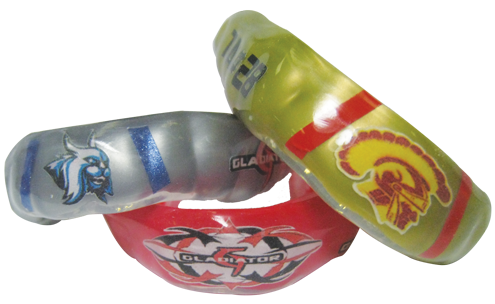Athletic Equipment: What Is The Shelf Life Of Your Mouthguard?

Like all athletic equipment, your mouthguard takes some wear and tear over the course of a long season. And that usage leads to things like damage or discomfort.
Should you replace your mouthguard each year, like some of your other sports gear? A good rule of thumb is replacing your mouthguard every calendar year. But like all protective equipment, your mouthguard does have a shelf life and this can vary based on usage and how you take care of it.
When is it time to fix or replace your mouthguard? Let’s take a look and see if your mouthguard is good to go for another season, or if it’s time to move on and get a new game face:
My Mouthguard Doesn’t Fit Tight Enough
If your mouthguard isn’t fitting snuggly enough against your upper teeth, it may just need a simple adjustment to fit you better. Thankfully, many mouthguards, whether custom-made or generic boil-and-bites, are able to be adjusted to be slightly tighter if they have loosened over time.
Just a little bit of heat helps to adjust the fit. However, if you have a custom mouthguard be careful, as too much heat has the ability to damage the guard. You may want to have the manufacturer do this for you. Please keep in mind, this is meant for very minor adjustments and tightening.
And if your mouthguard doesn’t fit tightly at all against your upper teeth, it may be time for a new one.
I’ve Been Chewing On My Mouthguard
Chewing on your mouthguard doesn’t just compromise the protective qualities of the guard, but the comfort as well. That’s because chewing breaks down the materials, creating rips and tears.
If your chewing has punctured your mouthguard in any way, it’s likely time to retire that guard. But if there are just slight indents, you should be able to re-smooth the surface for comfort with a smooth metal surface (a spoon works best).
Heat the metal and apply a small amount of cooking oil or edible lubricant. Using the heated and lubricated metal surface, gently smooth out the rough area. The heated metal helps to shape or smooth the guard, while the lubricant ensures the metal surface doesn’t stick to the mouthguard or pull the material, making the area worse.
My Mouthguard Is Damaged
As mentioned previously, if there is a rip or tear in your mouthguard, it is unable to be fixed and you must get a new mouthguard.
When a mouthguard is damaged — whether it is ripped, torn or delaminating — it doesn’t absorb impact properly, and tears allow bacteria to get into the material, further compromising the quality.
How long should your mouthguard last? If you take proper care of it, your custom mouthguard should see a few seasons. Just make sure to check it periodically.




 Like all athletic equipment, your mouthguard takes some wear and tear over the course of a long season. And that usage leads to things like damage or discomfort.
Like all athletic equipment, your mouthguard takes some wear and tear over the course of a long season. And that usage leads to things like damage or discomfort.
